# Description
Lint: `clippy::uninlined_format_args`
More readable in most situations.
(May be slightly confusing for modifier format strings
https://doc.rust-lang.org/std/fmt/index.html#formatting-parameters)
Alternative to #7865
# User-Facing Changes
None intended
# Tests + Formatting
(Ran `cargo +stable clippy --fix --workspace -- -A clippy::all -D
clippy::uninlined_format_args` to achieve this. Depends on Rust `1.67`)
# Description
This PR bumps the required rust version to 1.66.1.
# User-Facing Changes
# Tests + Formatting
Don't forget to add tests that cover your changes.
Make sure you've run and fixed any issues with these commands:
- `cargo fmt --all -- --check` to check standard code formatting (`cargo
fmt --all` applies these changes)
- `cargo clippy --workspace -- -D warnings -D clippy::unwrap_used -A
clippy::needless_collect` to check that you're using the standard code
style
- `cargo test --workspace` to check that all tests pass
# After Submitting
If your PR had any user-facing changes, update [the
documentation](https://github.com/nushell/nushell.github.io) after the
PR is merged, if necessary. This will help us keep the docs up to date.
# Description
This PR changes the old performance logging with `Instant` timers. I'm
not sure if this is the best way to do it but it does help reveal where
time is being spent on startup. This is what it looks like when you
launch nushell with `cargo run -- --log-level info`. I'm using the
`info` log level exclusively for performance monitoring at this point.
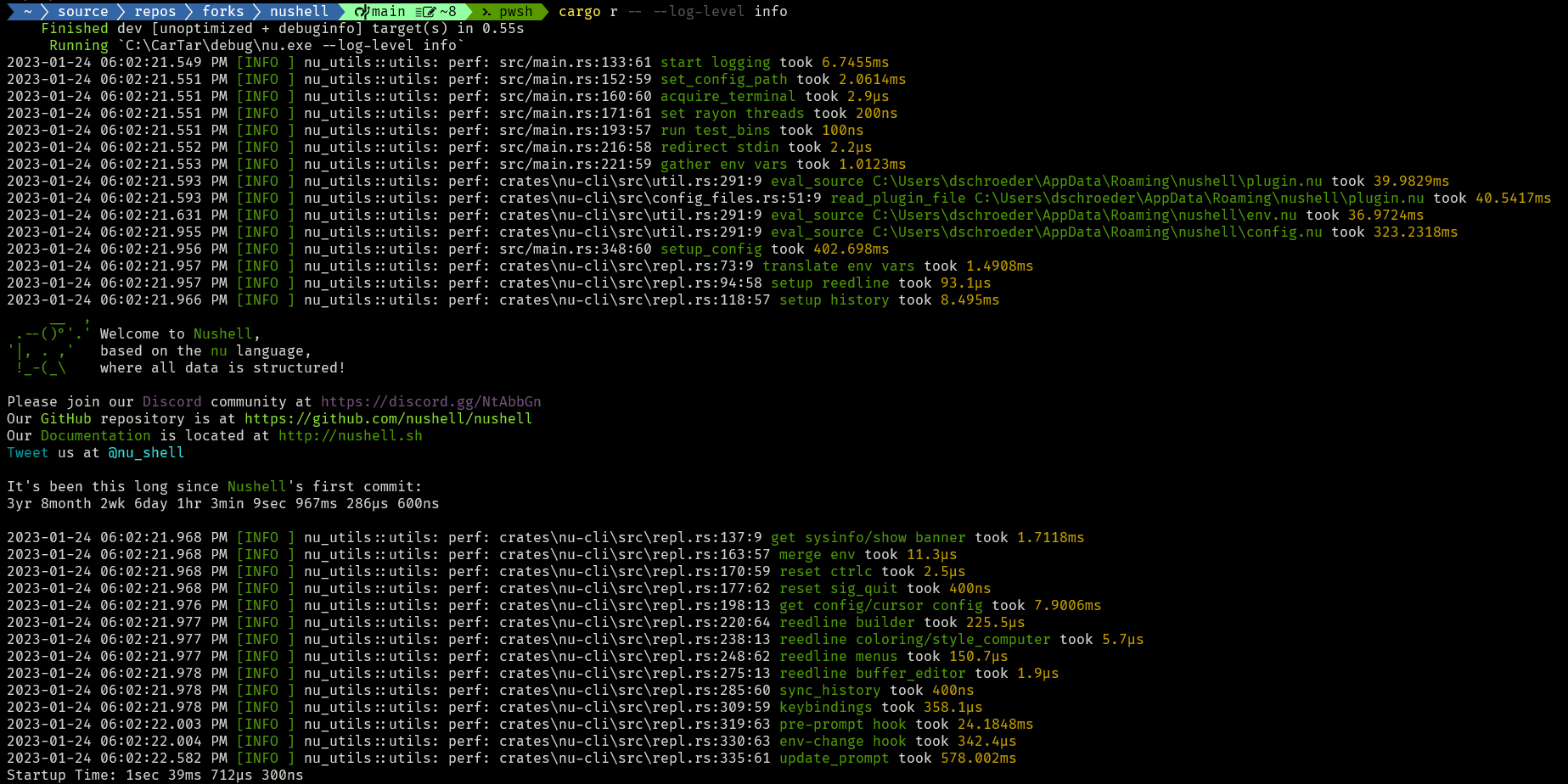
## After Startup
Since you're in the repl, you can continue running commands. Here's the
output of `ls`, for instance.
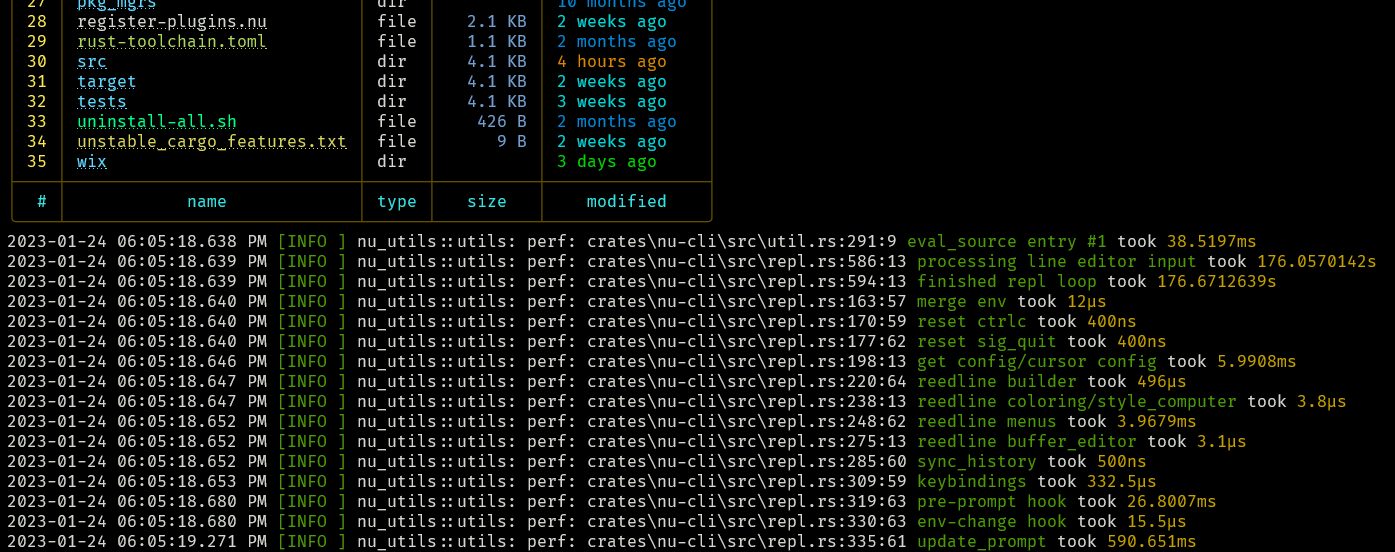
Note that the above screenshots are in debug mode, so they're much
slower than release.
# User-Facing Changes
# Tests + Formatting
Don't forget to add tests that cover your changes.
Make sure you've run and fixed any issues with these commands:
- `cargo fmt --all -- --check` to check standard code formatting (`cargo
fmt --all` applies these changes)
- `cargo clippy --workspace -- -D warnings -D clippy::unwrap_used -A
clippy::needless_collect` to check that you're using the standard code
style
- `cargo test --workspace` to check that all tests pass
# After Submitting
If your PR had any user-facing changes, update [the
documentation](https://github.com/nushell/nushell.github.io) after the
PR is merged, if necessary. This will help us keep the docs up to date.
# Description
This PR shows the startup time and decreases the banner. This startup
time output can be disabled with the `show_banner: false` setting in the
config. This is the startup in debug mode.
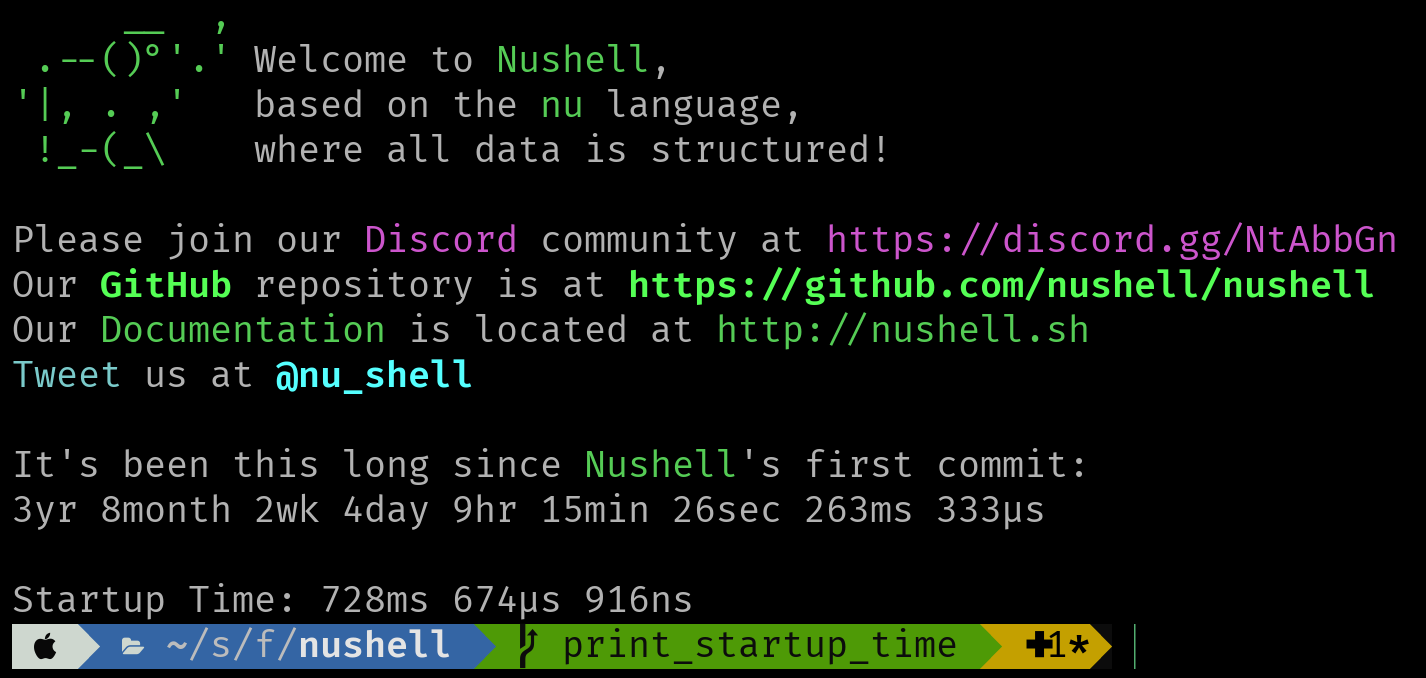
On my mac in release mode
```
Startup Time: 368ms 429µs 83ns
```
On my mac without a config as `nu --config foo --env-config foo`
```
Startup Time: 11ms 663µs 791ns
```
I could really go either way on this. If people don't like this change,
we don't have to merge it.
# User-Facing Changes
Startup Time
# Tests + Formatting
Don't forget to add tests that cover your changes.
Make sure you've run and fixed any issues with these commands:
- `cargo fmt --all -- --check` to check standard code formatting (`cargo
fmt --all` applies these changes)
- `cargo clippy --workspace -- -D warnings -D clippy::unwrap_used -A
clippy::needless_collect` to check that you're using the standard code
style
- `cargo test --workspace` to check that all tests pass
# After Submitting
If your PR had any user-facing changes, update [the
documentation](https://github.com/nushell/nushell.github.io) after the
PR is merged, if necessary. This will help us keep the docs up to date.
This is an attempt to implement a new `Value::LazyRecord` variant for
performance reasons.
`LazyRecord` is like a regular `Record`, but it's possible to access
individual columns without evaluating other columns. I've implemented
`LazyRecord` for the special `$nu` variable; accessing `$nu` is
relatively slow because of all the information in `scope`, and [`$nu`
accounts for about 2/3 of Nu's startup time on
Linux](https://github.com/nushell/nushell/issues/6677#issuecomment-1364618122).
### Benchmarks
I ran some benchmarks on my desktop (Linux, 12900K) and the results are
very pleasing.
Nu's time to start up and run a command (`cargo build --release;
hyperfine 'target/release/nu -c "echo \"Hello, world!\""' --shell=none
--warmup 10`) goes from **8.8ms to 3.2ms, about 2.8x faster**.
Tests are also much faster! Running `cargo nextest` (with our very slow
`proptest` tests disabled) goes from **7.2s to 4.4s (1.6x faster)**,
because most tests involve launching a new instance of Nu.
### Design (updated)
I've added a new `LazyRecord` trait and added a `Value` variant wrapping
those trait objects, much like `CustomValue`. `LazyRecord`
implementations must implement these 2 functions:
```rust
// All column names
fn column_names(&self) -> Vec<&'static str>;
// Get 1 specific column value
fn get_column_value(&self, column: &str) -> Result<Value, ShellError>;
```
### Serializability
`Value` variants must implement `Serializable` and `Deserializable`, which poses some problems because I want to use unserializable things like `EngineState` in `LazyRecord`s. To work around this, I basically lie to the type system:
1. Add `#[typetag::serde(tag = "type")]` to `LazyRecord` to make it serializable
2. Any unserializable fields in `LazyRecord` implementations get marked with `#[serde(skip)]`
3. At the point where a `LazyRecord` normally would get serialized and sent to a plugin, I instead collect it into a regular `Value::Record` (which can be serialized)
# Description
This PR allows the configuration of cursor shapes in nushell for each
edit mode. This is the change that is in the default_config.nu file.
```
cursor_shape: {
emacs: line # block, underscore, line (line is the default)
vi_insert: block # block, underscore, line (block is the default)
vi_normal: underscore # block, underscore, line (underscore is the default)
}
```
# User-Facing Changes
See above. If you'd prefer a different default, please speak up and let
us know.
# Tests + Formatting
Don't forget to add tests that cover your changes.
Make sure you've run and fixed any issues with these commands:
- `cargo fmt --all -- --check` to check standard code formatting (`cargo
fmt --all` applies these changes)
- `cargo clippy --workspace -- -D warnings -D clippy::unwrap_used -A
clippy::needless_collect` to check that you're using the standard code
style
- `cargo test --workspace` to check that all tests pass
# After Submitting
If your PR had any user-facing changes, update [the
documentation](https://github.com/nushell/nushell.github.io) after the
PR is merged, if necessary. This will help us keep the docs up to date.
A small but easy optimization for `evaluate_repl()`: clone
`engine_state` 1x instead of 3x.
This reduces time spent in a simple REPL eval (`enter` key pressed with
no command text) by about 10%, as measured in
[Superluminal](https://superluminal.eu/).
# Description
Fixes: #7706
# User-Facing Changes

# Tests + Formatting
Don't forget to add tests that cover your changes.
Make sure you've run and fixed any issues with these commands:
- `cargo fmt --all -- --check` to check standard code formatting (`cargo
fmt --all` applies these changes)
- `cargo clippy --workspace -- -D warnings -D clippy::unwrap_used -A
clippy::needless_collect` to check that you're using the standard code
style
- `cargo test --workspace` to check that all tests pass
# After Submitting
If your PR had any user-facing changes, update [the
documentation](https://github.com/nushell/nushell.github.io) after the
PR is merged, if necessary. This will help us keep the docs up to date.
Co-authored-by: Stefan Holderbach <sholderbach@users.noreply.github.com>
I have been recently going through some info logging in the cli and
noticed that there is too much info being printed to get a handle on
whats going on...
This is an attempt to do some minor logging clean up to print out "less
stuff",
in info logging mode mainly having to do with the prompt...
If someone really want to see what is going on they can very easily add
it
back in without too much trouble.
# Description
This closes#7498, as well as fixes an issue reported in
https://github.com/nushell/nushell/pull/7002#issuecomment-1368340773
BEFORE:
```
〉[{foo: 'bar'} {}] | get foo
Error: nu:🐚:column_not_found (link)
× Cannot find column
╭─[entry #5:1:1]
1 │ [{foo: 'bar'} {}] | get foo
· ────────┬──────── ─┬─
· │ ╰── value originates here
· ╰── cannot find column 'Empty cell'
╰────
〉[{foo: 'bar'} {}].foo
╭───┬─────╮
│ 0 │ bar │
│ 1 │ │
╰───┴─────╯
```
AFTER:
```
〉[{foo: 'bar'} {}] | get foo
Error: nu:🐚:column_not_found (link)
× Cannot find column
╭─[entry #1:1:1]
1 │ [{foo: 'bar'} {}] | get foo
· ─┬ ─┬─
· │ ╰── cannot find column 'foo'
· ╰── value originates here
╰────
〉[{foo: 'bar'} {}].foo
Error: nu:🐚:column_not_found (link)
× Cannot find column
╭─[entry #3:1:1]
1 │ [{foo: 'bar'} {}].foo
· ─┬ ─┬─
· │ ╰── cannot find column 'foo'
· ╰── value originates here
╰────
```
EDIT: This also changes the semantics of `get`/`select` `-i` somewhat.
I've decided to leave it like this because it works more intuitively
with `default` and `compact`.
BEFORE:
```
〉[{a:1} {b:2} {a:3}] | select -i foo | to nuon
null
```
AFTER:
```
〉[{a:1} {b:2} {a:3}] | select -i foo | to nuon
[[foo]; [null], [null], [null]]
```
# User-Facing Changes
See above. EDIT: the issue with holes in cases like ` [{foo: 'bar'}
{}].foo.0` versus ` [{foo: 'bar'} {}].0.foo` has been resolved.
# Tests + Formatting
Don't forget to add tests that cover your changes.
Make sure you've run and fixed any issues with these commands:
- `cargo fmt --all -- --check` to check standard code formatting (`cargo
fmt --all` applies these changes)
- `cargo clippy --workspace -- -D warnings -D clippy::unwrap_used -A
clippy::needless_collect` to check that you're using the standard code
style
- `cargo test --workspace` to check that all tests pass
# After Submitting
If your PR had any user-facing changes, update [the
documentation](https://github.com/nushell/nushell.github.io) after the
PR is merged, if necessary. This will help us keep the docs up to date.
# Description
Inspired by #7592
For brevity use `Value::test_{string,int,float,bool}`
Includes fixes to commands that were abusing `Span::test_data` in their
implementation. Now the call span is used where possible or the explicit
`Span::unknonw` is used.
## Command fixes
- Fix abuse of `Span::test_data()` in `query_xml`
- Fix abuse of `Span::test_data()` in `term size`
- Fix abuse of `Span::test_data()` in `seq date`
- Fix two abuses of `Span::test_data` in `nu-cli`
- Change `Span::test_data` to `Span::unknown` in `keybindings listen`
- Add proper call span to `registry query`
- Fix span use in `nu_plugin_query`
- Fix span assignment in `select`
- Use `Span::unknown` instead of `test_data` in more places
## Other
- Use `Value::test_int`/`test_float()` consistently
- More `test_string` and `test_bool`
- Fix unused imports
# User-Facing Changes
Some commands may now provide more helpful spans for downstream use in
errors
# Description
Fixes#7529.
# User-Facing Changes
_(List of all changes that impact the user experience here. This helps
us keep track of breaking changes.)_
# Tests + Formatting
Don't forget to add tests that cover your changes.
Make sure you've run and fixed any issues with these commands:
- `cargo fmt --all -- --check` to check standard code formatting (`cargo
fmt --all` applies these changes)
- `cargo clippy --workspace -- -D warnings -D clippy::unwrap_used -A
clippy::needless_collect` to check that you're using the standard code
style
- `cargo test --workspace` to check that all tests pass
# After Submitting
If your PR had any user-facing changes, update [the
documentation](https://github.com/nushell/nushell.github.io) after the
PR is merged, if necessary. This will help us keep the docs up to date.
# Description
Closes#6909. You can now add closures to your `color_config` themes.
Whenever a value would be printed with `table`, the closure is run with
the value piped-in. The closure must return either a {fg,bg,attr} record
or a color name (`'light_red'` etc.). This returned style is used to
colour the value.
This is entirely backwards-compatible with existing config.nu files.
Example code excerpt:
```
let my_theme = {
header: green_bold
bool: { if $in { 'light_cyan' } else { 'light_red' } }
int: purple_bold
filesize: { |e| if $e == 0b { 'gray' } else if $e < 1mb { 'purple_bold' } else { 'cyan_bold' } }
duration: purple_bold
date: { (date now) - $in | if $in > 1wk { 'cyan_bold' } else if $in > 1day { 'green_bold' } else { 'yellow_bold' } }
range: yellow_bold
string: { if $in =~ '^#\w{6}$' { $in } else { 'white' } }
nothing: white
```
Example output with this in effect:
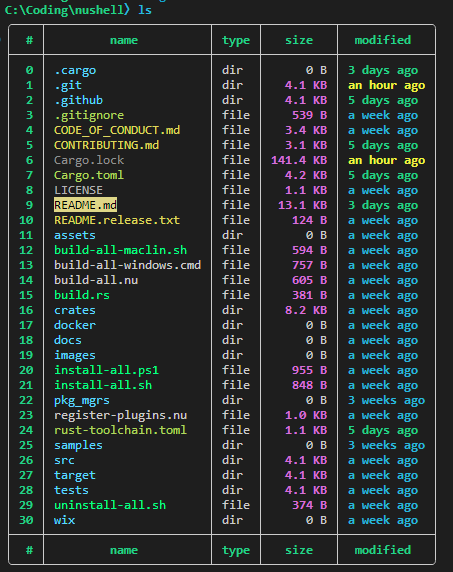


Slightly important notes:
* Some color_config names, namely "separator", "empty" and "hints", pipe
in `null` instead of a value.
* Currently, doing anything non-trivial inside a closure has an
understandably big perf hit. I currently do not actually recommend
something like `string: { if $in =~ '^#\w{6}$' { $in } else { 'white' }
}` for serious work, mainly because of the abundance of string-type data
in the world. Nevertheless, lesser-used types like "date" and "duration"
work well with this.
* I had to do some reorganisation in order to make it possible to call
`eval_block()` that late in table rendering. I invented a new struct
called "StyleComputer" which holds the engine_state and stack of the
initial `table` command (implicit or explicit).
* StyleComputer has a `compute()` method which takes a color_config name
and a nu value, and always returns the correct Style, so you don't have
to worry about A) the color_config value was set at all, B) whether it
was set to a closure or not, or C) which default style to use in those
cases.
* Currently, errors encountered during execution of the closures are
thrown in the garbage. Any other ideas are welcome. (Nonetheless, errors
result in a huge perf hit when they are encountered. I think what should
be done is to assume something terrible happened to the user's config
and invalidate the StyleComputer for that `table` run, thus causing
subsequent output to just be Style::default().)
* More thorough tests are forthcoming - ran into some difficulty using
`nu!` to take an alternative config, and for some reason `let-env config
=` statements don't seem to work inside `nu!` pipelines(???)
* The default config.nu has not been updated to make use of this yet. Do
tell if you think I should incorporate that into this.
# User-Facing Changes
See above.
# Tests + Formatting
Don't forget to add tests that cover your changes.
Make sure you've run and fixed any issues with these commands:
- `cargo fmt --all -- --check` to check standard code formatting (`cargo
fmt --all` applies these changes)
- `cargo clippy --workspace --features=extra -- -D warnings -D
clippy::unwrap_used -A clippy::needless_collect` to check that you're
using the standard code style
- `cargo test --workspace --features=extra` to check that all tests pass
# After Submitting
If your PR had any user-facing changes, update [the
documentation](https://github.com/nushell/nushell.github.io) after the
PR is merged, if necessary. This will help us keep the docs up to date.
Fixes#7342. `0..1000 | table` before this change:
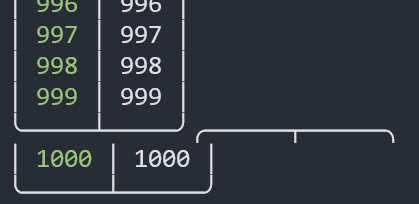
`0..1000 | table` after this change:
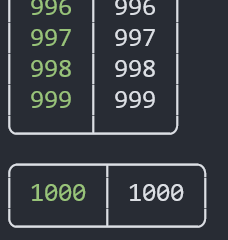
When piping data to `table`, pages were not getting a newline at the
end[^1]. This problem was uncovered and exacerbated by the new
`display_output` hook which implicitly piped _everything_ to `table`.
## The Fix
`PagingTableCreator` now adds a newline to each page instead of relying
on later code to do it.
## Tests
I spent a while trying to write a regression test for this behaviour but
I couldn't get the test to fail before my fix! I think the test
infrastructure does something special with newlines when it's checking
command output. I eventually ran out of steam trying to investigate
that, sorry.
[^1]: unless the pipe to table was the implicit one that's done when
there is no `display_output` hook set. That situation was still working
OK.
Reverts nushell/nushell#7448
Some surprising behavior in how we do this. For example:
```
〉if (true || false) { print "yes!" } else { print "no!" }
no!
〉if (true or false) { print "yes!" } else { print "no!" }
yes!
```
This means for folks who are using the old `||`, they possibly get the
wrong answer once they upgrade. I don't think we can ship with that as
it will catch too many people by surprise and just make it easier to
write buggy code.
Closes#7431. In a nutshell:
- `run_hook_block()` in repl.rs was collecting all input into a `Value`
instead of handling streaming input properly
- this was a problem because now we have a default `display_output` hook
that _everything_ gets piped to
- this PR fixes the problem by tweaking `run_hook_block()` to return a
`PipelineData` instead of a `Value`
After this change, individual pages are rendered as they finish. This is
a little easier to see if I tweak `STREAM_PAGE_SIZE` in table.rs to 10:
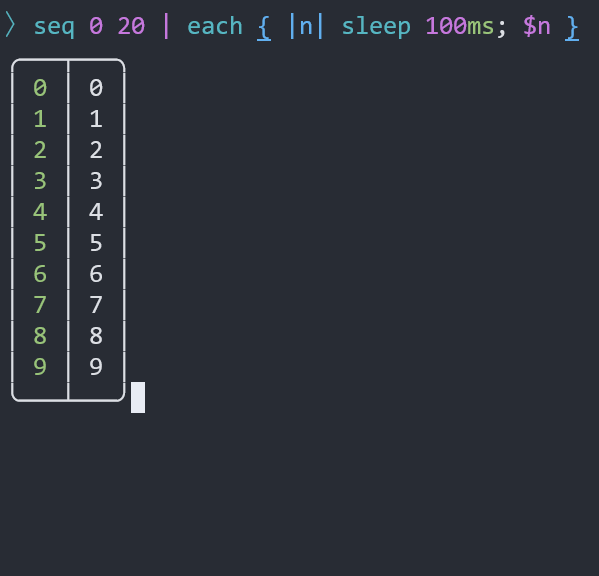
## Future work
This does _not_ fix https://github.com/nushell/nushell/issues/7342.
# Description
We got some feedback from folks used to other shells that `try/catch`
isn't quite as convenient as things like `||`. This PR adds `&&` as a
synonym for `;` and `||` as equivalent to what `try/catch` would do.
# User-Facing Changes
Adds `&&` and `||` pipeline operators.
# Tests + Formatting
Don't forget to add tests that cover your changes.
Make sure you've run and fixed any issues with these commands:
- `cargo fmt --all -- --check` to check standard code formatting (`cargo
fmt --all` applies these changes)
- `cargo clippy --workspace -- -D warnings -D clippy::unwrap_used -A
clippy::needless_collect` to check that you're using the standard code
style
- `cargo test --workspace` to check that all tests pass
# After Submitting
If your PR had any user-facing changes, update [the
documentation](https://github.com/nushell/nushell.github.io) after the
PR is merged, if necessary. This will help us keep the docs up to date.
# Description
When running `nu script.nu`, the `$env.FILE_PWD` will be set to the
directory where the script is.
Also makes the error message a bit nicer:
```
> target/debug/nu asdihga
Error: nu:🐚:file_not_found (link)
× File not found
╭─[source:1:1]
1 │ nu
· ▲
· ╰── Could not access file 'asdihga': "No such file or directory (os error 2)"
╰────
```
# User-Facing Changes
`FILE_PWD` environment variable is available when running a script as
`nu script.nu`.
# Tests + Formatting
Don't forget to add tests that cover your changes.
Make sure you've run and fixed any issues with these commands:
- `cargo fmt --all -- --check` to check standard code formatting (`cargo
fmt --all` applies these changes)
- `cargo clippy --workspace -- -D warnings -D clippy::unwrap_used -A
clippy::needless_collect` to check that you're using the standard code
style
- `cargo test --workspace` to check that all tests pass
# After Submitting
If your PR had any user-facing changes, update [the
documentation](https://github.com/nushell/nushell.github.io) after the
PR is merged, if necessary. This will help us keep the docs up to date.
# Description
While perusing Value.rs, I noticed the `Value::int()`, `Value::float()`,
`Value::boolean()` and `Value::string()` constructors, which seem
designed to make it easier to construct various Values, but which aren't
used often at all in the codebase. So, using a few find-replaces
regexes, I increased their usage. This reduces overall LOC because
structures like this:
```
Value::Int {
val: a,
span: head
}
```
are changed into
```
Value::int(a, head)
```
and are respected as such by the project's formatter.
There are little readability concerns because the second argument to all
of these is `span`, and it's almost always extremely obvious which is
the span at every callsite.
# User-Facing Changes
None.
# Tests + Formatting
Don't forget to add tests that cover your changes.
Make sure you've run and fixed any issues with these commands:
- `cargo fmt --all -- --check` to check standard code formatting (`cargo
fmt --all` applies these changes)
- `cargo clippy --workspace -- -D warnings -D clippy::unwrap_used -A
clippy::needless_collect` to check that you're using the standard code
style
- `cargo test --workspace` to check that all tests pass
# After Submitting
If your PR had any user-facing changes, update [the
documentation](https://github.com/nushell/nushell.github.io) after the
PR is merged, if necessary. This will help us keep the docs up to date.
# Description
Fixes#5424. Checking the code, apparently this was always supposed to
work; however, because it compared the `Suggestion`s directly, and
internal commands had descriptions while external commands did not, it
never did function properly.
# User-Facing Changes
Completing to external commands (with overlap) adds a caret so the
external command is actually run.
# Tests + Formatting
Don't forget to add tests that cover your changes.
Make sure you've run and fixed any issues with these commands:
- `cargo fmt --all -- --check` to check standard code formatting (`cargo
fmt --all` applies these changes)
- `cargo clippy --workspace -- -D warnings -D clippy::unwrap_used -A
clippy::needless_collect` to check that you're using the standard code
style
- `cargo test --workspace` to check that all tests pass
# After Submitting
If your PR had any user-facing changes, update [the
documentation](https://github.com/nushell/nushell.github.io) after the
PR is merged, if necessary. This will help us keep the docs up to date.
# Description
This fix changes pipelines to allow them to actually be empty. Mapping
over empty pipelines gives empty pipelines. Empty pipelines immediately
return `None` when iterated.
This removes a some of where `Span::new(0, 0)` was coming from, though
there are other cases where we still use it.
# User-Facing Changes
None
# Tests + Formatting
Don't forget to add tests that cover your changes.
Make sure you've run and fixed any issues with these commands:
- `cargo fmt --all -- --check` to check standard code formatting (`cargo
fmt --all` applies these changes)
- `cargo clippy --workspace -- -D warnings -D clippy::unwrap_used -A
clippy::needless_collect` to check that you're using the standard code
style
- `cargo test --workspace` to check that all tests pass
# After Submitting
If your PR had any user-facing changes, update [the
documentation](https://github.com/nushell/nushell.github.io) after the
PR is merged, if necessary. This will help us keep the docs up to date.
Also enforce this by #[non_exhaustive] span such that going forward we
cannot, in debug builds (1), construct invalid spans.
The motivation for this stems from #6431 where I've seen crashes due to
invalid slice indexing.
My hope is this will mitigate such senarios
1. https://github.com/nushell/nushell/pull/6431#issuecomment-1278147241
# Description
(description of your pull request here)
# Tests
Make sure you've done the following:
- [ ] Add tests that cover your changes, either in the command examples,
the crate/tests folder, or in the /tests folder.
- [ ] Try to think about corner cases and various ways how your changes
could break. Cover them with tests.
- [ ] If adding tests is not possible, please document in the PR body a
minimal example with steps on how to reproduce so one can verify your
change works.
Make sure you've run and fixed any issues with these commands:
- [x] `cargo fmt --all -- --check` to check standard code formatting
(`cargo fmt --all` applies these changes)
- [ ] `cargo clippy --workspace --features=extra -- -D warnings -D
clippy::unwrap_used -A clippy::needless_collect` to check that you're
using the standard code style
- [ ] `cargo test --workspace --features=extra` to check that all the
tests pass
# Documentation
- [ ] If your PR touches a user-facing nushell feature then make sure
that there is an entry in the documentation
(https://github.com/nushell/nushell.github.io) for the feature, and
update it if necessary.
# Description
This adds `break`, `continue`, `return`, and `loop`.
* `break` - breaks out a loop
* `continue` - continues a loop at the next iteration
* `return` - early return from a function call
* `loop` - loop forever (until the loop hits a break)
Examples:
```
for i in 1..10 {
if $i == 5 {
continue
}
print $i
}
```
```
for i in 1..10 {
if $i == 5 {
break
}
print $i
}
```
```
def foo [x] {
if true {
return 2
}
$x
}
foo 100
```
```
loop { print "hello, forever" }
```
```
[1, 2, 3, 4, 5] | each {|x|
if $x > 3 { break }
$x
}
```
# User-Facing Changes
Adds the above commands.
# Tests + Formatting
Don't forget to add tests that cover your changes.
Make sure you've run and fixed any issues with these commands:
- `cargo fmt --all -- --check` to check standard code formatting (`cargo
fmt --all` applies these changes)
- `cargo clippy --workspace -- -D warnings -D clippy::unwrap_used -A
clippy::needless_collect` to check that you're using the standard code
style
- `cargo test --workspace` to check that all tests pass
# After Submitting
If your PR had any user-facing changes, update [the
documentation](https://github.com/nushell/nushell.github.io) after the
PR is merged, if necessary. This will help us keep the docs up to date.
# Description
This is a set of fixes to `err>` to make it work a bit more predictably.
I've also revised the tests, which accidentally tested the wrong thing
for redirection, but should be more correct now.
# User-Facing Changes
_(List of all changes that impact the user experience here. This helps
us keep track of breaking changes.)_
# Tests + Formatting
Don't forget to add tests that cover your changes.
Make sure you've run and fixed any issues with these commands:
- `cargo fmt --all -- --check` to check standard code formatting (`cargo
fmt --all` applies these changes)
- `cargo clippy --workspace -- -D warnings -D clippy::unwrap_used -A
clippy::needless_collect` to check that you're using the standard code
style
- `cargo test --workspace` to check that all tests pass
# After Submitting
If your PR had any user-facing changes, update [the
documentation](https://github.com/nushell/nushell.github.io) after the
PR is merged, if necessary. This will help us keep the docs up to date.
This adds new pipeline connectors called out> and err> which redirect either stdout or stderr to a file. You can also use out+err> (or err+out>) to redirect both streams into a file.
* add signature information when help on one command
* tell user that one command support operated on cell paths
Also, make type output to be more friendly, like `record<>` should just be `record`
And the same to `table<>`, which should be `table`
* simplify code
* don't show signatures for parser keyword
* update comment
* output arg syntax shape as type, so it's the same as describe command
* fix string when no positional args
* update signature body
* update
* add help signature test
* fix arg output format for composed data type like list or record
* fix clippy
* add comment
This adds support for (limited) mutable variables. Mutable variables are created with mut much the same way immutable variables are made with let.
Mutable variables allow mutation via the assignment operator (=).
❯ mut x = 100
❯ $x = 200
❯ print $x
200
Mutable variables are limited in that they're only tended to be used in the local code block. Trying to capture a local variable will result in an error:
❯ mut x = 123; {|| $x }
Error: nu::parser::expected_keyword (link)
× Capture of mutable variable.
The intent of this limitation is to reduce some of the issues with mutable variables in general: namely they make code that's harder to reason about. By reducing the scope that a mutable variable can be used it, we can help create local reasoning about them.
Mutation can occur with fields as well, as in this case:
❯ mut y = {abc: 123}
❯ $y.abc = 456
❯ $y
On a historical note: mutable variables are something that we resisted for quite a long time, leaning as much as we could on the functional style of pipelines and dataflow. That said, we've watched folks struggle to work with reduce as an approximation for patterns that would be trivial to express with local mutation. With that in mind, we're leaning towards the happy path.
* New "display_output" hook.
* Fix unrelated "clippy" complaint in nu-tables crate.
* Fix code-formattng and style issues in "display_output" hook
* Enhance eval_hook to return PipelineData.
This allows a hook (including display_output) to return a value.
Co-authored-by: JT <547158+jntrnr@users.noreply.github.com>
Allows use of slightly optimized variants that check if they have to use
the heavier vte parser. Tries to avoid unnnecessary allocations. Initial
performance characteristics proven out in #4378.
Also reduces boilerplate with right-ward drift.
* Add support to render right prompt on last line of the prompt
* reset reedline to main branch
* update reedline to fix right prompt to be rendered correctly
* reset reedline to main branch again